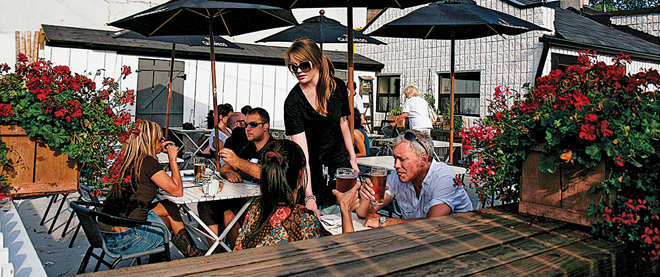Toronto’s war on fun
If only we could shrug it off as a quirky hangover from its Victorian origins
Jessica Darmanin
Share

You can interpret a city’s ambitions by the face it presents to the world. When it comes to Toronto, its streets fretted with bars called Harlem and Brooklynn, the skyline spiked by condo developments with names like The Manhattan, and the Legoland imitation Times Square installed at the corner of Yonge and Dundas, it is clear that the city wants to be New York. Which is funny, because there are few large cities in the world that are less like New York than Toronto. Where New York is dense and chaotic, Toronto is sprawling and orderly. New York has endless canyons of stunning architecture, while Toronto’s flat streetscapes look like they were designed by blindfolded six-year-olds. And while New York is resolutely devoted to upholding its rep as the city that never sleeps, Toronto wages a relentless war on fun.
Let’s start with an old favourite, the municipal ban on ball hockey on city streets. Every Canadian kid plays street hockey, but only in Toronto is it a furtive activity, occurring under the reproachful gaze of signs declaring “Ball and Hockey Playing Prohibited.” Defenders of the bylaw argue it is harmless because it is so seldom enforced, and that trying to get rid of it might cause more problems than it solves. But that misses the crucial point, which is that it is a fundamental principle of a free society that what is not explicitly prohibited is permitted. A city that feels the need to prohibit many things is one that deep down does not trust the citizens with their freedom.
It isn’t only homegrown pastimes the city finds objectionable. Last summer, Toronto became one of the few jurisdictions on Earth—along with the Taliban regime that terrorized Afghanistan between 1996 and 2001—to prohibit kite flying in a park. The ban was a response to complaints about debris left from kite-fighting competitions held by members of the city’s Afghan and South Asian communities—the leftover string was apparently disrupting lawn mowing and fouling trees, and there were concerns that some of it was embedded with glass shards that could endanger birds. A year later, city officials are trying to come up with a compromise. Part of the proposed solution involves a prohibition on “competitive kite flying in parks that have significant bird activity,” though the definition of “significant” remains unresolved. At any rate, it doesn’t appear to concern anyone that the freedom to fly a kite without being harassed by petty little officials was one of the reasons many of these people moved their families thousands of kilometres away from their homelands in the first place.
But this chintzy nickel-and-diming of pleasure in the city of Toronto is blind to colour or creed. Two years ago, a community group took over an abandoned shack in Christie Pits that had an old oven in it, and started hosting impromptu neighbourhood pizza nights. The city’s response? Pay a $100 fee for a permit and cough up money to pay a city staffer to watch over things.
This was pretty much the same approach the city took in February, when organizers of a youth group in Toronto’s immigrant-heavy Jane and Finch neighbourhood thought it would be fun to host a skating party at a local rink, complete with cookout and hot chocolate with marshmallows. The event was seen as a way of helping teens from places like Somalia and Cambodia get accustomed to the leisure rituals of their new country. It too was kiboshed, after the city demanded the group spend $80 applying for a permit and then purchase $2 million in liability insurance.
Now that the warm weather has arrived, Toronto’s war against fun has drawn new targets. Hence the recent denial of a permit for Afrofest, the African cultural festival that has been held in Queen’s Park for the past 23 years. Then there is Mayor Rob Ford’s assault on street art, which recently saw a squad of jihadis from the city’s Ministry of Boring erase a mural that the artist says the city paid him $2,000 to paint in the first place. Finally, there is the ongoing battle over restaurant patios. Officially, every patio in the city has to be closed down by 11 p.m., but some are allowed to remain open till 2 a.m. It varies from neighbourhood to neighbourhood, depending entirely on the whim and whimsy of the local strongman on city council.
It would be nice if we could just shrug this off as a quirky hangover from the city’s Victorian origins. But much as it seems to wish it were otherwise, Toronto isn’t a colonial backwater anymore; it is one of the largest cities in North America, and one of the most culturally diverse in the world. Indeed, it might be precisely because of that diversity that city officials are so afraid of fun. After all, every culture defines fun in its own distinct ways, and if you allow a free-for-all of fun, who knows what sort of problems might ensue. But this is the sort of gambit that is guaranteed to backfire: preventing South Asians from flying kites, or Somalis from having a skating party, is exactly the sort of overweening cultural paternalism that hinders new groups from properly integrating.
Ultimately, people flock to the great cities of the world—Paris and London, Hong Kong and New York—because they are places where anything is possible, and everything is up for grabs. “The city is a competition,” as some Frenchman once wrote. But if Toronto is a competition, then city officials are dedicated to ensuring it’s the only one in the world where everyone loses.